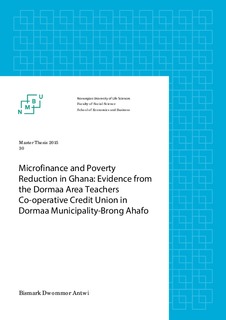| dc.contributor.author | Antwi, Bismark Dwommor | |
| dc.date.accessioned | 2015-08-03T11:01:30Z | |
| dc.date.available | 2015-08-03T11:01:30Z | |
| dc.date.copyright | 2015 | |
| dc.date.issued | 2015-08-03 | |
| dc.identifier.uri | http://hdl.handle.net/11250/294216 | |
| dc.description.abstract | This study examines the impact of microfinance on poverty reduction in Ghana, using evidence from the Dormaa Area Teachers Co-operative Credit Union (DATCCU) in Dormaa Municipality, Brong Ahafo Region. Using cross-sectional data, a quasi-experiment was conducted with three communities in the municipality in a treatment and control framework. A survey was then conducted of beneficiary members, non-beneficiary members and non-members of the DATCCU credit scheme in all three communities. The unique survey design allowed for a simple and straightforward estimation of the programme’s impact. The results show that the DATCCU credit scheme and participation in it in general have had no significant impact on annual household income, savings and the total value of basic household assets acquired. That is, there is no evidence of microfinance contributing to poverty reduction in the municipality | nb_NO |
| dc.language.iso | eng | nb_NO |
| dc.publisher | Norwegian University of Life Sciences, Ås | |
| dc.subject | Microfinance | nb_NO |
| dc.subject | Poverty | nb_NO |
| dc.subject | Impact evaluation | nb_NO |
| dc.subject | DATCCU | nb_NO |
| dc.subject | Dormaa Municipality | nb_NO |
| dc.subject | Ghana | nb_NO |
| dc.title | Microfinance and poverty reduction in Ghana : evidence from the Dormaa Area Teachers Co-operative Credit Union in Dormaa Municipality-Brong Ahafo | nb_NO |
| dc.type | Master thesis | nb_NO |
| dc.subject.nsi | VDP::Social science: 200 | nb_NO |
| dc.subject.nsi | VDP::Social science: 200::Economics: 210 | nb_NO |
| dc.source.pagenumber | 75 | nb_NO |
| dc.description.localcode | M-ECON | nb_NO |
